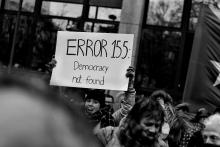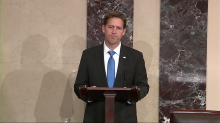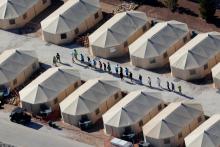Opinion

Now as a mother of a young adult and two teenagers, I believe it is important to share my story so that society is aware that sexual assault occurs frequently, even in Asian American communities. Just because we do not share our experiences publicly does not mean that Asian Americans are immune to sexual violence. Just because we carry the burden for decades doesn’t make our experiences untrue. Just because we do not share our stories doesn’t mean that we need to continue to live in shame.

Editor’s Note: This article originally appeared in a 2005 issue of Sojourners magazine.
"El Papa Juan Pablo Segundo Murió" read the banner shown on the TV set in the El Salvador bar I was sitting in April 2, 2005. The pope's death had been rumored all week. One taxi driver told me the pope was dead, though the next one informed me he was not.

Throughout The Scandal of Redemption, Oscar Romero identifies a God with a balanced concern for individual hearts and the souls of nations.
The book, which collects sermons, radio transcripts and diary entries from Romero’s three years as archbishop of San Salvador, comes at a crucial time. Romero, pierced by an assassin’s bullet in 1980, will be canonized by the Catholic Church this weekend. A saint in every way we use the word, the life this book sketches is a timeless model for faithful political resistance and spiritual revival.

In the years since, the predominant narrative of the TRC making great strides to heal apartheid has been re-examined. In focus group interviews with victims, analysis of the victims’ transcripts, and amnesty hearings, University of Connecticut researcher Audrey Chapman found a disparity between the goals of the TRC and of the South African people.

Perhaps now, more than ever, Christians need to redefine their relationship to rage — particularly women’s rage. The nation watched Dr. Christine Ford testify about her alleged assault while maintaining a gracious demeanor whereas Brett Kavanaugh was allowed to rant about his supposed mistreatment. This double standard stems from centuries of social conditioning, as well as a rather sexist interpretation of the Bible that argues women are to be silent and submissive.
The urgency of this #MeToo moment, especially its potential disruption of normative social behavior toward women, has led to the challenging of inter-communal attitudes including those expressed by religious institutions. Congregants from diverse establishments of faith, including Christians and Jews, have come out in opposition of not only the repression of sexual abuse victims but against clerical power structures. Muslim women, who are often spoke of rather than to, are also using this moment to advocate on behalf of themselves and each other.

Of course the system is rigged — systems are always rigged to protect the wealth, power, and self-interest of those who created them, those who benefit from them. That’s not hyperbole; that’s reality, that’s human nature, and that’s what the Bible calls sin. And that’s why systems need to be held accountable — to the common good rather than just the system makers and controllers. And that’s why Jesus calls us to protect, in particular, "the least of these" who are most vulnerable to the systems' exploitation. This is why defending systems that just maintain the powerful’s own self-interest while neglecting the interests of others, especially the most vulnerable, is not just bad politics — it’s bad theology.

On the 20th anniversary of her canonization, we have the opportunity to reassess St. Edith Stein’s life and legacy. Instead of remembering her simply as a tragic victim, we can take a deeper look at the work she undertook during her lifetime. Over the course of four decades, Stein dedicated her life to civic engagement and political resistance. From volunteering with the Red Cross in World War I, to participating in the women’s suffrage movement in Prussia, to fighting for equal educational opportunities for women, to writing against the rise of the Nazi regime, Stein is much more than the “Holocaust martyr” – she is the patron saint of political resistance.

Do you feel powerless to challenge and change the deeply entrenched privilege that was on display last week? Don’t give into that feeling. You have the power to change the world. Look at how it’s changing already.

Like Sasse, moderate pastors who don’t want to upset the conservatives in their churches find themselves talking about how “all of us” are broken. How “all of us” are to blame. They talk about how social media is hurting us. How a broken sexual ethic is hurting us. And if the sexual abuse victims sitting in their congregation are anything like me, they are thinking, “No. A man hurt me.”

As a civil rights activist from the civil rights movement of the ‘60s, I continue to believe that everyone has constitutional rights. Thousands of Americans are being denied their civil and human rights because insensitive or politically manipulated legislators are creating policies that are destroying the environment. When profits, rather than the well-being of human and environmental life, determine the survival of the planet, it is a civil rights issue.

Alaska has a “linguistic emergency,” according to the Alaskan Gov. Bill Walker. A report warned earlier this year that all of the state’s 20 Native American languages might cease to exist by the end of this century, if the state did not act. American policies, particularly in the six decades between the 1870s and 1930s, suppressed Native American languages and culture. It was only after years of activism by indigenous leaders that the Native American Languages Act was passed in 1990, which allowed for the preservation and protection of indigenous languages. Nonetheless, many Native American languages have been on the verge of extinction for the past many years.

To be sure, Muslim women are among the survivors of sexual assault and violence. But narratives of oppressed Muslim women suffering from a violent and sexually abusive religion have often functioned as a distraction, a means of keeping the attention of our elected leaders on the presumably greater threat posed by lecherous Muslim men so that they need not come to terms with the full extent of the physical and sexual abuse women in the United States experience, nor with the ways white evangelicals contribute to the conditions facilitating this abuse.

The day when I was a kid, I watched that bird escape and fly away, not once did I consider what the ordeal it must’ve been like for it. How afraid it must’ve been being swallowed up in the darkness. The loneliness it must’ve felt. Confusion. The hurt and anger of being violated and victimized. And what of the consequences had it never returned to the nest. Would its family miss it? Would there be songs to mourn its absence? Were there young that depended on its safe return for survival?

Modern, Euro-American Christianity is deeply implicated in the colonial legacies which have crushed indigenous peoples. Reckoning with this is not easy. The doctrine of discovery provides an example. The doctrine of discovery was a Christian invention which justified dispossessing indigenous peoples of their land, parceling it out among emerging nation-states, and turning it into private property for settlers. In this framework, indigenous peoples are left with either extermination or assimilation.

These attacks on people’s innate dignity and sacred worth assault our most cherished moral and religious values. We read in Genesis that all people are made in the image of God. In Paul’s letters, he proclaims that in God earthly divisions fall away, that all people form part of God’s body. Jesus himself promises: Whatever you do to the least of these, you do to me. Attempts to excuse human rights abuses committed against some people are thus not just unconstitutional — they assault God by denigrating and desecrating that divine, indwelling spark.

Climate change is a crisis of moral proportions. Rather than responding to the climate crisis with resignation or cynicism, our congregations can chart a new path forward by responding to this moral crisis in a distinctively religious way. By probing deeply into our religious traditions, we can present truths that are needed in this time of climate catastrophe.

I think Christians have to do organizing, because it helps us to broaden whatever kind of tunnel vision some of our own traditions unwittingly produce in this fundamentalist age. I often tell my congregation that organizing, justice work, is essential for Christian discipleship, because it helps our heart become less wicked. It puts you in relationship and conversation with both systems and individuals that you may need to learn from, or you may need to help transform. I think organizing is critically important in that way.

And nearly every Sunday, as broken bread stands for broken bodies, I am struck with the words of James Baldwin, when he wrote that to be born black or a person of color in America means that you must “give up all hope of communion.”
When Baldwin wrote those words he believed that the nation was both a Christian nation and a white nation. White supremacy was the foundation of American rites and rights. Whiteness was a prerequisite to be encircled by compassion and included in citizenship. The denial of communion — the denial of the body of Christ and the rejection from the body politic — was connected to the nation’s original sin.

One of the highlights of my trip to Costa Rica was visiting Teatro Nacional de Costa Rica in San Jose. Taking a break from the beaches and after consuming a healthy amount of papaya and platanos, I wanted to go there to see the area outside the theater, which has busts of some of the Central American country’s famous writers: Eunice Odio, Joaquín Gutierrez, and Yolanda Oreamuno. After the visit, with the help of some of my tias and primas, I even brought home a few books from these authors. They were particularly pleased I was interested in reading literature from Costa Rica.